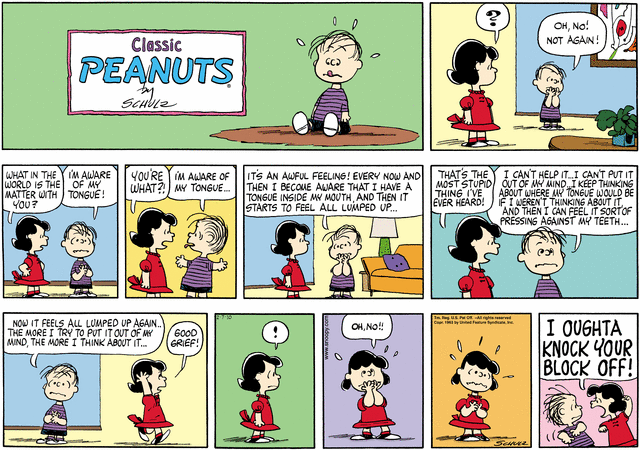
One of my favorite stand-up comedians, Emo Philips, tells a relatively benign joke that kind of creeps me out whenever I think about it:
“I used to think that the brain was the most wonderful organ in my body. Then I realized who was telling me this.”
The connection between the brain, consciousness, and human identity is really a bizarre thing. The brain is this squishy, unassuming organ that resides in the head, and it processes countless actions per second. It is the source of conscious and unconscious thought. It dutifully delegates commands to regulate respiration, digestion, muscle control, and immune system defense. It performs all of these actions in perfect concert with each other, and yet it perplexingly remains a mystery to itself. If it weren’t for the benefit of research and education, a person’s brain could potentially remain unconscious of itself throughout an entire lifetime. The thought of that is strange and unsettling to me.
In Julia Sweeney’s one-person monologue, Letting Go of God, Sweeney aptly illustrates the tension between biological truths and human perception:
When I think of myself as my innermost being, I just don’t think of it as a body function. My brain creates this idea that my “self” is not it “self”. I mean, I think of my “self” as something separate looking out from my eyes, listening through my ears, pulling the strings that make my body move. And that’s because the brain is not able to perceive its own functioning. And this is true for all of us, by the way, right from childhood. When a child is told that it’s their brain that thinks … they don’t think that their brain is them. They think their brain is this thinking, computing machine, something that is added to their “self” to help them understand things. And yet the mind is what the brain does, just like pumping blood is what the heart does.
So what is consciousness, and what is self? And how much room is there left for the existence of a soul? I’m afraid those are questions that I’m just not equipped to answer.
The more I think about my own brain, it seems stranger, and more unfamiliar to me. Yet isn’t that a strange thought to have? My brain — the computing center of all my feelings and thoughts — is unwittingly disturbed by its very own mundane existence and processes. There is a cyclical conflict inside my own head that exacerbates with each revelation, and with each reaction to those revelations. I think of my mind, and I realize that it’s just a function of my brain, and it spooks me to think that there is an entity within myself that can be so intimately intertwined with my identity, and yet it feels so distant and unfamiliar. But then my brain pushes back, almost as if it were offended by the very thoughts that it just created, and suddenly I find my head folding and unfolding in a perpetual spiral of self-doubt and confusion. It all just makes me very dizzy.
I consider the sensation a mild form of madness, something akin to the distress that Linus from Peanuts feels when he becomes aware of his own tongue.

These are the kind of thoughts that keep me awake at night. It drives me crazy, because I know my brain knows better than to provoke a fight with itself right before bed. This is probably where all of the insomnia comes from.
“Good Grief” indeed, Lucy.

I think it’s more of “thinking about your thinking”, which would be the equivalent of talking about yourself in third person. And knowing you, someone talking about themselves in third person would irk you. heh
Lucy is such a bitch.